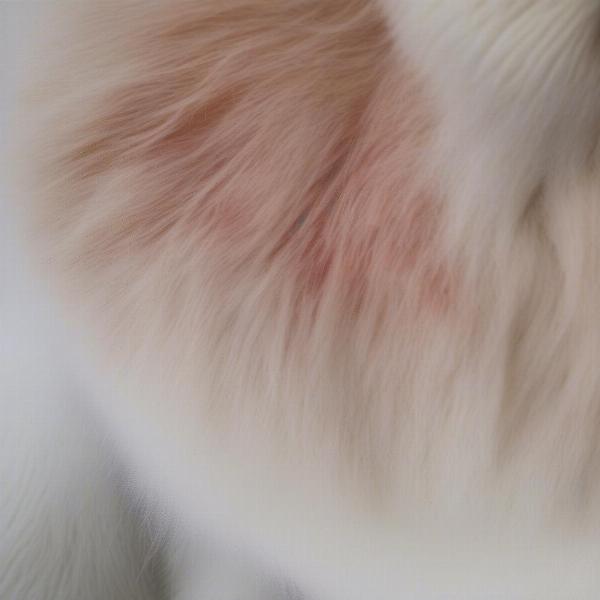Crust white dog isn’t a recognized dog breed. It’s possible that “crust” refers to a skin condition, or perhaps a misunderstanding of a breed name. This article will explore potential interpretations of “crust white dog,” focusing on white dog breeds and common skin conditions that can cause crusting. We’ll cover how to identify and manage these issues, ensuring your furry friend stays healthy and happy.
 White Dog with Skin Condition
White Dog with Skin Condition
Could “Crust” Refer to a Skin Problem?
Many skin ailments can cause crusting in dogs, regardless of their color. Allergies, infections (bacterial, fungal, or parasitic), and autoimmune diseases can all lead to inflamed, crusty skin. These conditions often present with other symptoms like itching, redness, hair loss, and sometimes even a foul odor.
If your white dog has crusty skin, it’s crucial to consult a veterinarian. They can diagnose the underlying cause and recommend appropriate treatment, which might include medicated shampoos, oral or topical medications, or dietary changes.
Common White Dog Breeds
While “crust white dog” isn’t a breed, there are numerous white dog breeds. Perhaps you’re looking for information on one of these:
- West Highland White Terrier (Westie): These small, spirited dogs are known for their bright white coat and independent nature.
- Samoyed: A larger breed with a fluffy white coat, Samoyeds are friendly and energetic.
- Bichon Frise: These small, playful dogs are instantly recognizable by their puffy white coat, often styled in elaborate cuts.
- Great Pyrenees: These gentle giants are known for their thick white fur and protective instincts.
- American Eskimo Dog: A Spitz-type breed, American Eskimos come in various sizes and are known for their striking white coat and intelligence.
Caring for a White Dog’s Coat
Keeping a white dog’s coat pristine can be challenging. Regular grooming is essential to prevent matting and staining. This includes brushing, bathing with a whitening shampoo, and sometimes even professional grooming.
Skin Issues in White Dogs
White dogs aren’t necessarily more prone to skin problems than dogs of other colors. However, skin issues might be more noticeable on a white coat. Redness, crusting, and discoloration are easier to spot on light fur.
What to Do if Your Dog Has Crusty Skin
- Consult a vet: This is the most important step. Don’t try to self-diagnose or treat your dog’s skin condition.
- Follow your vet’s instructions: Adhere to the prescribed treatment plan, whether it involves medication, dietary changes, or grooming routines.
- Maintain a healthy diet: Providing a balanced diet can support skin health.
- Regular grooming: Brushing and bathing can help prevent and manage skin issues.
Conclusion
While “crust white dog” isn’t a specific breed, understanding the potential meanings of the term can help you better care for your canine companion. Whether you have a white dog with a skin condition or are simply curious about white dog breeds, consulting a veterinarian and following proper grooming practices are crucial for ensuring your dog’s health and well-being.
FAQ
- Are white dogs more prone to skin allergies? No, not necessarily. Skin issues are often more visible on white dogs.
- What causes crusty skin in dogs? Allergies, infections, and autoimmune diseases are some common causes.
- How can I treat my dog’s crusty skin? Consult a veterinarian for a diagnosis and treatment plan.
- What are some popular white dog breeds? West Highland White Terriers, Samoyeds, and Bichon Frises are a few examples.
- How can I keep my white dog’s coat clean? Regular brushing, bathing with whitening shampoo, and professional grooming can help.
- Is it normal for my dog’s skin to be a little flaky? Some flaking can be normal, but excessive flaking or crusting should be checked by a vet.
- What should I do if my dog is constantly itching and scratching? It could be a sign of a skin condition, so consult your vet.
Related Articles
ILM Dog is your trusted global resource for expert dog care advice. We cover a range of topics, from breed selection and health care to training, nutrition, and grooming. Whether you’re a first-time owner or a seasoned expert, ILM Dog offers practical and reliable information to help you provide the best possible care for your furry friend. Contact us for personalized guidance: Email: [email protected], Phone: +44 20-3965-8624.